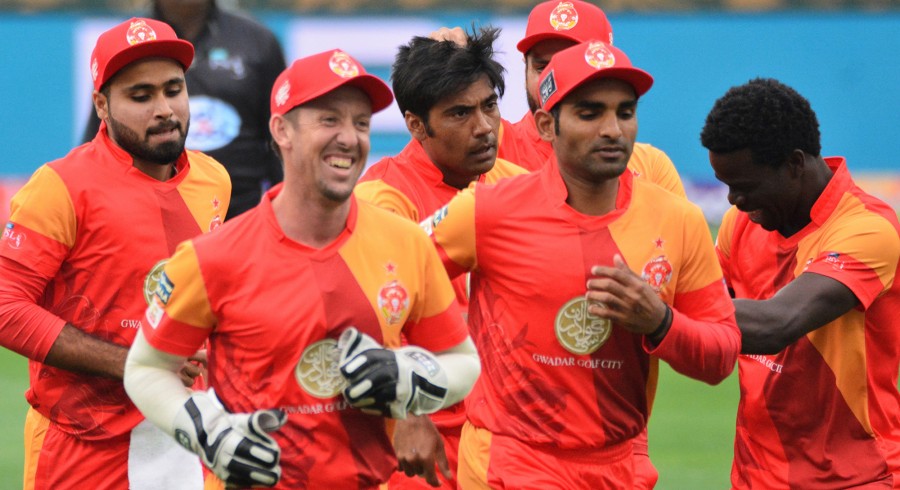Franchise will be under new captain Mohammad Sami during their hunt for glory
 PHOTO COURTESY: Twitter/@PSL
PHOTO COURTESY: Twitter/@PSL
Islamabad United is easily the most successful franchise of the Pakistan Super League (PSL) with two titles to their name after three seasons. United won the inaugural edition of the league in 2016 and then backed it up with another title in 2018.
In their only other season, where they did not win the title, United finished fourth on the table and lost to Karachi Kings in the eliminator.
United have notched up 20 victories out of a total of 32 matches in the first three editions of the league, while ending up on the losing side on 12 occasions.
With a nice blend of youth and experience, United will once again look to put their best foot forward in the upcoming season of PSL.
Strengths
One of the key aspects of United’s squad is that they have all bases covered, with players fit for various roles.
In the batting department, they have a solid opening pairing of Luke Ronchi and Sahibzada Farhan, along with the experience of England’s Ian Bell and South Africa’s Cameron Delport in the middle-order.
In bowling, Pakistan leg-spinner Shadab Khan and England’s slow left-arm spinner Samit Patel are ideal options in the spin-friendly conditions of the United Arab Emirates (UAE).
They can also call upon the brisk pace of Mohammad Sami and swing/seam of Faheem Ashraf, the latter being the joint highest wicket-taker in the third edition with the new ball.
Weaknesses
Left-arm pacer Rumman Raees played a crucial role in United’s success in the past with his skilful bowling — which included variations of pace and seam.
He suffered a knee injury while fielding during a PSL3 match against Quetta Gladiators in Sharjah. The injury has kept him away from the game, but he will be making a comeback in mainstream cricket, during the upcoming edition of the league.
Raees has the ability to bowl with great effect, both with the new ball and at the backend of the innings, but lack of match practice might reduce his effectiveness.
United would ideally want him to have a similar sort of impact, like in the past, but heading into the tournament, there are still doubts about whether he is fit enough to be on top of his game.
Player to watch out for
Since bursting on to the scene during the second edition of PSL, leg-spinner Shadab Khan has not looked back.
His outstanding performances with the ball during the second and third season helped him secure a permanent spot in the Pakistan national side, as he made his T20I and ODI debut soon after the second edition of the league.
Despite being just 20-years-old, Khan has a calm head on his shoulders and remains unflustered even when bowling in pressure situations.
He possesses a lethal googly, something which has bamboozled even the best in the business, but that is not his only weapon as he is equally good at bowling conventional leg-spinners and flippers.
Over the past few years, wicket-taking bowlers like Khan have played a key role in team’s victories in T20 cricket as its helps curtail the flow of runs considerably. United would be hoping that the leg-spinner would continue to do the same in the fourth edition of PSL as well.
Captaincy
Mohammad Sami’s name for the captaincy role came as a bit of a surprise for the fans especially in the presence of wicketkeeper-batsman Luke Ronchi — who was pivotal to their title-winning campaign in 2018.
Sami’s brief international career was marred due to inconsistencies in his bowling displays but the advent of PSL has breathed a new life into his cricketing career.
He has taken 37 wickets in 27 PSL matches at an economy rate of just 6.55, and is also the second high wicket-taker in the league’s history.
His captaincy experience is limited to domestic circuit matches for Karachi and leadership is something you won’t associate with the right-arm pacer. But being the senior-most member of the squad with a wealth of experience, the 37-year-old can command the respect of his teammates, but his decision making skills will be tested in pressure situations.
Islamabad United Squad
Overseas: Luke Ronchi (New Zealand), Ian Bell (England), Samit Patel (England), Phil Salt (Wales), Cameron Delport (South Africa), Wayne Parnell (South Africa) and Zahir Khan (Afghanistan)
Local: Shadab Khan, Faheem Ashraf, Asif Ali, Mohammad Sami, Rumman Raees, Hussain Talat, Waqas Maqsood, Sahibzada Farhan, Zafar Gohar, Mohammad Musa, Nasir Nawaz, Amad Butt and Rizwan Hussain.